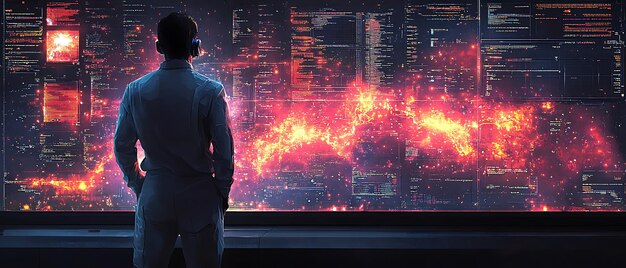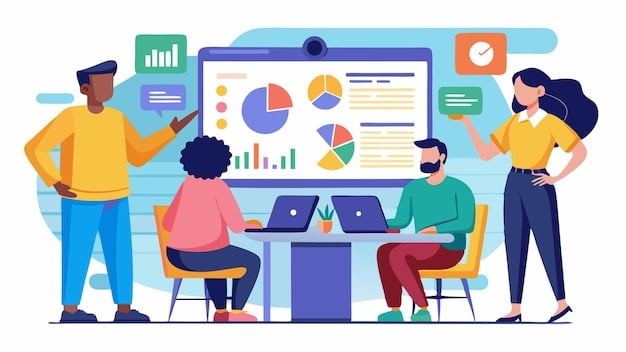Decoding the Future: Understanding Trends and Technologies

Decoding involves unraveling complex systems, technologies, or trends to understand their underlying mechanisms, implications, and potential future impact.
The term decoding often sounds complex, but in essence, it’s about making sense of the world around us. Whether it’s deciphering a complex trend, understanding advanced technology, or interpreting market dynamics, decoding is an essential skill in today’s rapidly changing world. Join us as we break down the concept and explore its practical applications.
What Does Decoding Really Mean?
At its core, decoding is the process of converting a message or signal into a comprehensible form. Think of it as translating from one language to another, except that the “language” could be anything from DNA sequences to consumer behavior. In today’s world, decoding helps us to navigate the vast amounts of information and complexity by revealing hidden patterns, meanings, and possibilities.
The Basics of Coding and Decoding
The concepts of coding and decoding are deeply entwined. Coding involves converting information into a specific format for transmission or storage, while decoding reverses this process to retrieve the original information. This is fundamental in many areas, from telecommunications to computer science. For example, in cryptography, coding (encryption) ensures that information remains secure, while decoding (decryption) enables authorized parties to access it.
Decoding as a Cognitive Process
Beyond technology, decoding also plays a crucial role in human cognition. When we read, we decode written symbols into meaningful language. When we listen, we decode sound waves into understandable speech. These processes happen almost instantaneously and unconsciously, but they highlight the brain’s remarkable ability to make sense of the world. Understanding this cognitive aspect can improve how we communicate and learn.

In summary, decoding is a versatile term that involves transforming complex, encoded data into an understandable format, whether in the form of technology or human comprehension. This ability to translate complex information is essential for anyone looking to find meaning in our increasingly complex world.
Why Decoding is Essential in Today’s World
In a world inundated with data and rapid technological advancements, the ability to decode is more critical than ever. It’s no longer enough to simply receive information; one must understand, interpret and contextualize it effectively. This ability gives individuals and organizations a competitive edge, allowing them to make informed decisions, anticipate future trends, and innovate more effectively.
Decoding Trends and Market Dynamics
Businesses rely on decoding market trends to identify opportunities and manage risks. By analyzing consumer behavior, economic indicators, and technological shifts, companies can make strategic decisions about product development, marketing, and investment. Without this decoding ability, businesses risk becoming either obsolete or irrelevant in a highly dynamic marketplace.
- Consumer Behavior Analysis: Understanding why consumers make certain choices.
- Economic Indicators: Monitoring economic trends to predict market movements.
- Technological Shifts: Staying ahead of technological changes to innovate.
Decoding Complex Technologies
Many emerging technologies, such as artificial intelligence, blockchain, and biotechnology, can seem daunting. Decoding these technologies involves breaking them down into understandable components, assessing their capabilities, and understanding their limitations. Professionals need to decode emerging technologies, not merely to understand them superficially, but to grasp their potential impact and application.
Decoding provides the following benefits:
- Demystifying AI: Understanding how AI algorithms work and their impact on decision-making.
- Blockchain Applications: Seeing how blockchain can be used beyond cryptocurrencies.
- Biotech Potentials: Discovering the ethical and practical implications of biotechnology advancements.
Decoding is crucial for navigating complicated data and trends in our world. It empowers us to make better choices, innovate, and stay competitive. Whether in business or technology, developing decoding capabilities is necessary for success and adaptability.
How to Improve Your Decoding Skills
Improving your decoding skills is a continuous process that involves curiosity, critical thinking, and a willingness to learn. By actively engaging with complex information and developing structured approaches to understanding, you can significantly enhance your ability to decode the world around you. This improvement not only benefits you personally but also enhances your professional capabilities.

Cultivate Critical Thinking
Critical thinking involves questioning assumptions, evaluating evidence, and forming reasoned judgments. To improve your critical thinking:
- Ask Questions: Always question the origins and implications of information.
- Evaluate Sources: Determine the credibility and biases of your sources.
- Formulate Judgments: Only formulate judgments after thorough analysis.
Structured Learning Approaches
Having a structured approach to learning can greatly enhance comprehension. By breaking down complex topics into smaller, manageable components, you can systematically decode them:
- Deconstruct Complex Topics: Break down large subjects into smaller, understandable parts.
- Create Mind Maps: Visually organize information to see connections and relationships.
- Summarize Key Points: Regularly summarize what you’ve learned to reinforce understanding.
To sum up, improving your decoding abilities involves enhancing your critical thinking and using structured learning approaches. These skills can help you navigate through complex subjects and improve your understanding of the world.
Decoding in Different Industries
The principles of decoding apply across a wide range of industries, each requiring specialized skills and knowledge. From finance to healthcare, the ability to decode complex information is essential for innovation, decision-making, and strategic planning. Here, we explore how decoding is applied in different sectors.
Finance
In the financial industry, decoding involves analyzing market data, economic trends, and investment opportunities. Financial professionals need to decode complex financial instruments, assess risk, and predict market movements:
- Market Data Analysis: Interpreting stock prices, trading volumes, and other market indicators.
- Risk Assessment: Evaluating the potential risks associated with investments.
- Trend Forecasting: Predicting future market trends based on current data.
Healthcare
In healthcare, decoding involves interpreting medical data, understanding patient health outcomes, and analyzing clinical trial results. Healthcare providers and researchers need to decode a great amount of information to give the best possible treatment with the latest information:
- Medical Data Interpretation: Analyzing patient records, lab results, and imaging scans.
- Outcome Analysis: Evaluating the effectiveness of treatments and interventions.
- Clinical Trial Results: Understanding the implications of clinical research findings.
To state, decoding concepts are applicable to a multitude of industries, enabling specialists to process data, navigate challenges, and devise effective strategies. Developing these decoding skills is vital for remaining competitive and promoting innovation in an ever-evolving professional landscape.
Tools and Technologies for Decoding
Several tools and technologies are essential for decoding complex information. These tools help in the efficient analysis, interpretation, and management of data, enabling professionals to uncover insights and make informed decisions. From data analytics software to specialized hardware, the right tools can significantly enhance your ability to decode complex systems.
Data Analytics Software
Data analytics software is crucial for decoding large and complex datasets. These tools allow users to perform statistical analysis, data visualization, and predictive modeling:
Examples Include:
- Tableau: Facilitates data visualization and analysis.
- SPSS: Used for statistical analysis.
- R and Python: Programming languages for advanced data analysis.
Specialized Hardware
In some industries, specialized hardware plays a critical role in decoding. For example, in genetics, DNA sequencers decode the genetic code, providing valuable information for research and diagnostics:
Examples Include:
- DNA Sequencers: Used to decode genetic information.
- Medical Imaging Devices: MRI, CT scanners, and X-ray machines decode internal body structures.
- Signal Analyzers: Used in telecommunications to decode signals.
In conclusions, the tools and technologies that are used for decoding vary greatly depending on the field. From software for analyzing data to equipment for deciphering genetic information, these instruments are vital for making sense of complex systems and data.
The Future of Decoding
The future of decoding is intertwined with the continued advancement of technology and the increasing complexity of our world. As we generate more data and develop more complex systems, the ability to decode effectively will become even more critical. Emerging trends in technology, such as AI and machine learning, are poised to transform how we approach decoding, offering new possibilities and challenges.
AI and Machine Learning
AI will automate many aspects of decoding, making it possible to analyze vast amounts of data quickly and accurately. Machine learning algorithms can identify patterns and anomalies that humans might miss, providing deeper insights into complex systems. AI and machine learning will automate many aspects of decoding and will provide a closer, more accurate analysis.
Ethical Considerations
As decoding becomes more powerful, ethical considerations become increasingly important. It’s crucial to ensure that decoding is used responsibly and ethically, protecting individual privacy and promoting fairness and transparency. Decoding has ethical considerations that include protecting privacy while promoting fairness.
| Key Concept | Brief Description |
|---|---|
| 💡 Basics of Decoding | Converting complex information into understandable forms. |
| 📈 Importance Today | Essential for making decisions and adapting to changes. |
| 🛠️ Decoding Tools | Software and hardware that simplify data analysis and interpretation. |
| 🤖 Future Trends | AI and machine learning are expected to automate analysis. |
Frequently Asked Questions
▼
Decoding involves translating a message or signal into a comprehensible form. This can apply to anything from deciphering a piece of encoded data to understanding consumer trends.
▼
Learning to decode helps you understand information. It lets you make better-informed decisions, innovate effectively, and stay competitive in fast-changing environments.
▼
You can improve your decoding skills by cultivating critical thinking, questioning assumptions, and assessing source credibility. Also, utilize structured learning approaches to better understanding.
▼
Tools like data analytics software and specialized hardware can be great. Tableau, and SPSS can help with analyzing data. DNA sequencers can help decode genetic information.
▼
The future of decoding will be greatly influenced by advancements in AI and machine learning, which can automate data analysis. We must ensure these are applied responsibly and ethically as decoding capabilities grow.
Conclusion
In summary, decoding is an essential skill for navigating the complexities of today’s world. From understanding market dynamics to interpreting technological advancements, the ability to decode enables individuals and organizations to make informed decisions and drive innovation. As technology continues to evolve, the importance of decoding will only increase, making it a crucial skill for success in the future.





